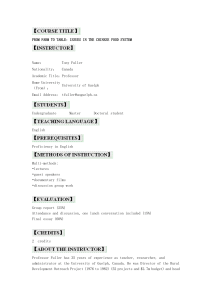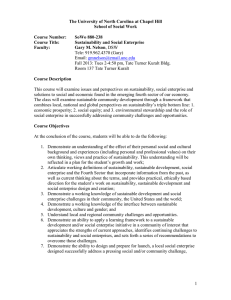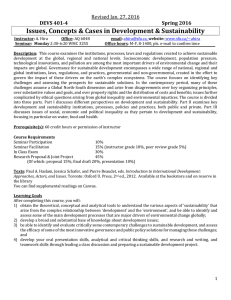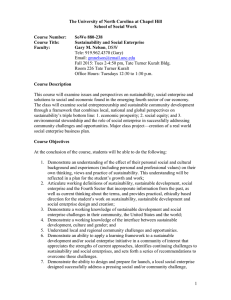Teaching Environmental Law and Sustainability
advertisement
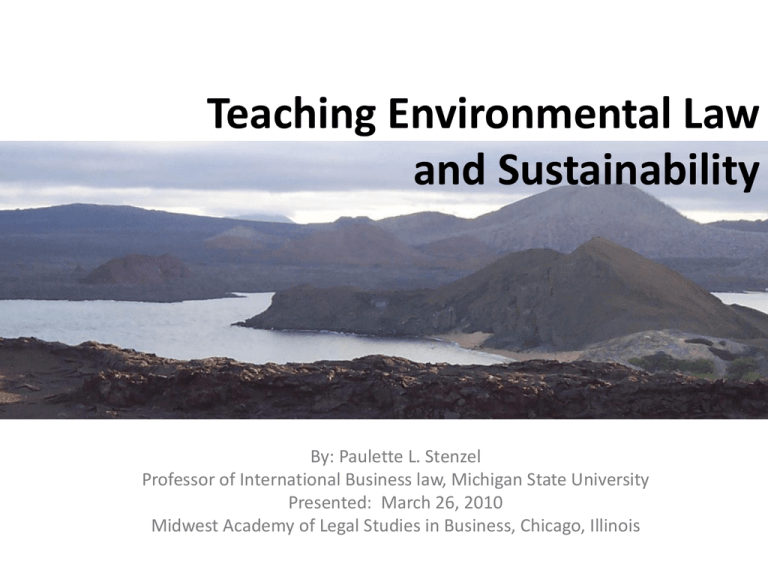
Teaching Environmental Law and Sustainability By: Paulette L. Stenzel Professor of International Business law, Michigan State University Presented: March 26, 2010 Midwest Academy of Legal Studies in Business, Chicago, Illinois Course Objectives and Content: Work as a learning community to seek understanding of: Environmental challenges faced in the United States and throughout the world. Sustainability viewed through the lens of the Triple Bottom Line: economy, social equity, and environment. • Mechanisms available in U.S. law for environmental clean up and protection. • Environmental laws in other selected countries, comparing them to those of the U.S. • Selected international agreements and how implementation of them affects the Triple Bottom Line. • Voluntary environmental protection programs set up by businesses and non-governmental organizations (NGOs). • How environmental laws affect businesses on a day-to-day basis. Who enrolls and why? Fulfills requirements for: • MSU-wide: Residential Initiative in Studies of the Environment (R.I.S.E.) specialization • Broad College of Business: International Specialization • Planned for Fall 2010: MSU-wide Sustainability Specialization Others enroll out of interest: • Use as elective within various majors • Honors Students also welcome (H-Option available) Structure of Course • Three hour weekly seminar • Emphasis on learning community • Allows for guest speakers, film, and video clips. Teaching Tools and Assignments Build on outline of “Environmental Law” at start of class each week. Students complete • 10 out of 13 reflections on preceding week’s readings and class discussion. Due Fridays in on-line drop box. • 8 out of 11 “informed contributions” • Paper #1: Informed evaluation of film Food, Inc. – Requires study of related legal materials. • Paper #2 Business interview on sustainability and environmental practices. – Presentation, PowerPoint, and Paper. No exams: Goal is to focus on overall learning in holistic way Required Reading: Books • DANAHER, BIGGS & MARK, BUILDING THE GREEN ECONOMY: SUCCESS STORIES FROM THE GRASS ROOTS (2007). One or more chapters discussed each week during the semester. • RAY C. ANDERSON, CONFESSIONS OF A RADICAL INDUSTRIALIST • ALAN SNITOW & DEBORAH KAUFMAN WITH MICHAEL FOX, THIRST: FIGHTING THE CORPORATE THEFT OF OUR WATER Other materials • Articles selected from Internet • Articles and PowerPoints by Professor Stenzel. Course Content Day #1: Introduction to class and themes: – “Hi! Who are you?” – What is environmentalism? – What is sustainability? Course Content Day #2: Sustainable Development & How Companies Portray Themselves – Informed contribution: • Analysis of advertisements. Greenwashing? – Readings and discussion: • Silent Spring • Tragedy of the Commons Course Content Day #3: Toxic Torts – Informed contribution: • News article about a toxic torts case in U.S. or other nation – Discussion of “A Civil Action” • Students must view movie before class • List of questions to prepare as view film – Includes instruction on civil procedure, negligence, proximate cause, use of expert witnesses, etc. Course Content • Day #4: Pursuit of Clean Air: Domestic Air Pollution Control – Mobile & Stationary – U.S. and examples from other nations. • Day #5: International Perspectives on Air pollution Control, Climate Change, and Energy – Use of domestic (private) law: Canadian Smelter Case. – International treaties and protocols. Course Content • Day #6: Pursuit of Clean Water; Environmental Impact Statements; Sustainability Ramifications of International Trade Agreements. – Focus on DR: CAFTA as example of trade agreement. • Day #7: “Global Warming, Sustainability, and You Are What You Eat” – Paper #1 due: Informed reaction to movie. Food Inc. Assigned background readings. – Guest speaker “Food, Global Warming, and You Are What You Eat” Course Content • Day #8: Tools for the pursuit of sustainability: Fair Trade, organics, local sourcing, and micro-finance. – Informed contribution: Visit to a local store to gather data about Fair Trade, organics, and local products. – Presentation on Fair Trade in Nicaragua by Prof. Stenzel – Panel discussion with guests: • Manager of Fair Trade store, • Manager of East Lansing Food Cooperative, and • Professor who specializes in urban farming & local sourcing. Course Content • Day #9. Building a Sustainable Business. – Discussion of Ray Anderson’s book. • Day #10: The Energy Business. – Guest speaker: Attorney/owner of alternative energy business. • Day #11: Water Issues and Initiatives. – Discuss book THIRST. Course Content • Day #12: Hazardous Wastes: RCRA, CERCLA, & Transboundary Shipment of Wastes. – Guest speaker: From the Michigan Attorney General’s office on Asian Carp Controversy and Invasive Species in the Great Lakes. • Day #13: Pursuit of More Sustainable Businesses and Living – Brownfields – LEEDS Certification Final Project • Days #14 & #15 (Final session): Presentations based on Business Site Visit and Interview. Examples: Final Project • Days #14 & #15 (Final session): Presentations based on Business Site Visit and Interview. Examples: Student Reactions • Conclusions: What students say about this course. What makes it unique? Is it effective? Student Reactions • Conclusions: What students say about this course. – What makes it unique? – Is it effective? – How well have you learned? For more information see www.tradeandsustainability.com



